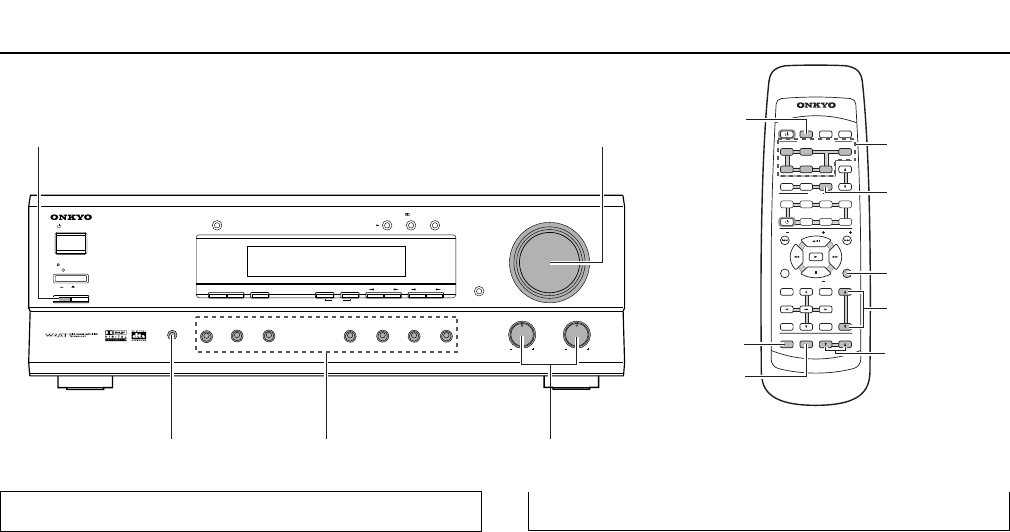
22
Selecting a sound source
Selecting a sound source
1. Press the desired input selector button.
The selected source name appears in the display.
If the TAPE button is pressed, either the TAPE or MD input
which has been selected beforehand will be displayed. The
TAPE and MD sources can be switched alternately by holding
the TAPE button for about 2 seconds.
2. When the selected source is other than FM or
AM, press the AUDIO SELECTOR button on the
front panel or the AUDIO SEL button on the
remote controller to select an audio input signal
format.
Each time the button is pressed, the setting cycles; “AUTO”
→
“MULTI CH”
→
“ANALOG”
→
“AUTO” (back to the
beginning) (refer to page 23).
3. Make sure that the
SPEAKERS A indicator lights
up in the display.
If it does not light, press the SPEAKERS A button.
4. Start playing the selected input source.
Follow the operating instructions for the source device.
5. Adjust the volume with the MASTER VOLUME
dial on the front panel or the VOLUME 5/∞
buttons on the remote controller.
Turn the MASTER VOLUME dial clockwise to increase the
volume or counterclockwise to decrease it.
6. Adjust the tone with the BASS and TREBLE
control knobs on the front panel.
Turn the BASS and TREBLE control knobs to adjust the bass
and treble response from the Front speakers (refer to page 8).
Note:
If you hear no sound from the speakers, check the following items:
• Make sure that all devices and speakers are connected
correctly and securely.
• The sound is muted when the MUTING indicator flashes.
Press the MUTING button on the remote controller to cancel
the mute function (refer to page 23).
• When you select a source that is connected to the DIGITAL
INPUT jacks on the rear panel, you must select digital input
(refer to page 12).
R
C
-
4
4
6
M
R
E
M
O
T
E
C
O
N
T
R
O
L
L
E
R
STANDBY/ON
OFF
ON
POWER
MASTER VOLUME
BASS
TREBLE
AV
RECEIVER
HT-R490
FM
AM C
D
TAPE
VIDEO
1
DVD
ABSPEAKERS
DIMMER
SURROUND
DTS/
VIDEO
2
VCR
AUDIO
SELECTOR
LISTENING MODE
DSP
STEREO
DISPLAY
STANDBY
SP SEL TUNING PRESET
MEMORY
SW
MODE
DIGITAL
INPUT
FM
MODE
CLEAR
INPUT SELECTOR
SLEEP DIMMERDISPLAY
CD TAPE TUNER
D V D VIDEO 1 VIDEO 2
SUR MODE
SW MODEAUDIO SEL
TUNER
PRESET
STANDBY/ ON
DISC
MUTING
VOLUME
TOP MENU
MENU
CH SEL
RETURN
SETUP
TEST TONE
LEVEL
ENTER
VOLUME 5/∞
SPEAKERS A
AUDIO SELECTOR
LEVEL 5/∞
AUDIO SEL
MUTING
CH SEL
TEST TONE
SLEEP
CH
TV/VCR
CH TV VOL
TV VOL
MODE
TV CABLESATELLIT E
VCR
STANDBY/ ON
DVD CD TAPE
Input selector
INPUT
SELECTOR
BASS/TREBLE
MASTER VOLUME
Using MULTI CHANNEL INPUT
The MULTI CHANNEL INPUT refers to a system, which is
compatible with a source component equipped with 5.1-channel
outputs (DVD player, MPEG decoder, etc.), reproducing the left/
right front, center and left/right surround channels from five
respective speakers and outputting the subwoofer channel from
SUB WOOFER PRE OUT (refer to page 11).
1. Press AUDIO SELECTOR button repeatedly to
select “MULTI CH”.
2. Turn on the component connected to the MULTI
CHANNEL INPUT port and start playing the
desired media.
3. If necessary, press the CH SEL button on the
remote controller to select an individual
speaker. Then press the LEVEL 5/∞ button to
adjust the output level as desired.
Adjust the speaker output level so that you can hear the same
sound level from each speaker at the listening position. For the
front right, front left, center, surround right and surround left
speakers, the output levels can be adjusted between –12 to +12
dB. The subwoofer can be adjusted between –30 to +12 dB.
The volume levels from the speakers reproducing MULTI
CHANNEL INPUT are independent from the speaker levels
set using the test tone (page 21). These settings are not applied
to speakers reproducing MULTI CHANNEL INPUT.
Notes:
• MULTI CH cannot be selected when FM or AM is selected as
the input source.
• The surround mode cannot be selected when MULTI CH is
selected. Also, if MULTI CH is selected during use of a
surround mode, it is canceled automatically.
• If the speaker level is set to +1 dB or higher, the maximum
level indicated in the display will change if you raise the
volume level.
• Regardless of the speaker configuration, the input signal will
be output to each corresponding speaker. For example, even if
the speaker configuration is set to 2 ch, sound comes from all
speakers.


















